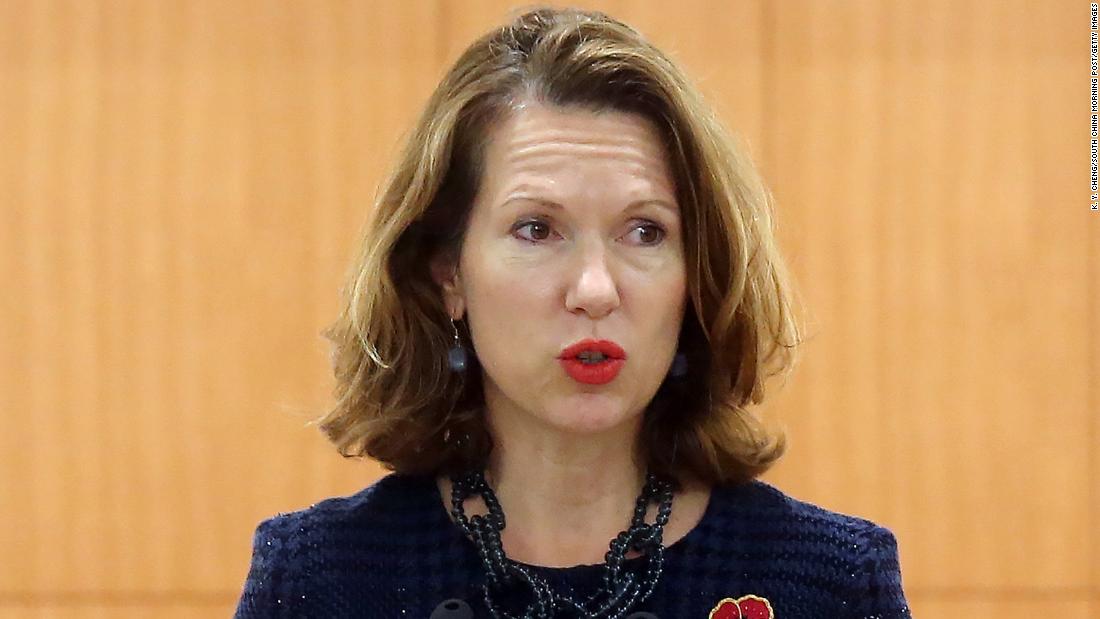On Tuesday, China’s Foreign Ministry spoke to Ambassador Caroline Wilson and filed a formal complaint against a post she published last week on WeChat, the popular Chinese social media network.
In the article, Wilson argued that “foreign media in China are being misinterpreted, which obscures their positive role”.
“Foreign media criticism of Chinese officials does not mean that they do not like China,” she wrote. “On the contrary, I believe that they act in good faith and play an active role in monitoring government actions, ensuring that people have access to accurate information and protecting those who have no voice.”
Last month, British regulator Ofcom withdrew state broadcaster China Global Television Network, or CGTN, from British airwaves, saying the channel’s license holder had no “editorial responsibility” for its production. The authorities also said that CGTN could not transfer its license to a new entity because it would still be controlled by the Chinese Communist Party.
A week later, the National Radio and Television Administration of China (NRTA) banned BBC World News, claiming that the network had broadcast reports about China that “violated the principles of truthfulness and impartiality in journalism”.
In his post on WeChat, WIlson added that local news organizations in China often face tougher conditions than foreign ones.
“Unlike the foreign media, the Chinese media can only do critical reporting under conditions permitted by the government,” she wrote.
The article angered Chinese officials, who called Wilson’s post “inappropriate”.
In a statement on Tuesday, the head of the European Affairs department at the Ministry of Foreign Affairs of China said Wilson was “complaining [on behalf of] individual foreign media sanctioned for false news and inaccurate reports, deliberately confusing defamation of news with news monitoring and being ‘selectively blind’ to the repression of the foreign side in the Chinese media. “
During the meeting, the Chinese official “emphasized that the Chinese government and people are never opposed to foreign media, but those who produce false news and violently attack China, the Chinese Communist Party and the Chinese system under the banner of ‘freedom of press’ and ‘freedom of expression’ ”, according to a statement from the Ministry of Foreign Affairs of China.
The ministry said Wilson’s article spread “widespread discontent among the Chinese public and was heavily criticized”. Since then, it has not been shared on WeChat.
Tencent (TCEHY), the Chinese technology giant that operates the messaging platform, added a warning to the post, saying it “violates” the rules of the platform. The company did not immediately respond to a request for comment on Wednesday.
Wilson doubled in his post Tuesday.
“I keep my article,” she said
on twitter.
The American social networking service is blocked in China.
“Without a doubt, the Chinese ambassador who is leaving the UK defends the more than 170 pieces he was free to put in the mainstream British media,” added Wilson, referring to Liu Xiaoming, a longtime envoy from China to Great Britain. Brittany.
“The United Kingdom is committed to freedom of the media and to the defense of democracy and human rights worldwide. We will always defend the freedom of the media and the right of journalists to do their jobs,” said a Foreign spokesman. , The UK’s Commonwealth and Development Office in a statement. The British embassy in Beijing declined to comment beyond Wilson’s comments.
In another coup on Wednesday, China’s Foreign Ministry spokesman Zhao Lijian called Wilson’s article “an intervention in China’s internal affairs, [which] reflects its consistent double standards and deeply rooted ideological prejudice. “
Latent tension
Chinese officials often criticize the country’s portrait in the Western media, but its focus on the BBC has been particularly acute in recent months. Beijing has repeatedly expressed its frustration at the vehicle’s report on China’s crackdown on Uighurs and other ethnic Muslim minorities in Xinjiang.
Before CGTN was banned in the UK, Chinese state media launched several attacks on the BBC for what it called “malicious” reporting on the human rights issue in Xinjiang. The BBC defended its report.
A few weeks after the United Kingdom revoked CGTN’s broadcasting license, CGTN posted a video entitled: “Why is the BBC spreading false news against China?” referring to the coverage of the British network in Hong Kong and Xinjiang.
Ofcom also imposed a £ 125,000 ($ 173,000) fine on CGTN on Monday over several programs that aired in 2019 over the Hong Kong protests. The agency had already decided that CGTN repeatedly violated the standards of impartiality in covering the demonstrations.
The agency also announced a £ 100,000 ($ 139,000) fine for disclosing the confession of a British citizen who was arrested in China in 2013. The man, Peter Humphrey, said his confession was forced.
